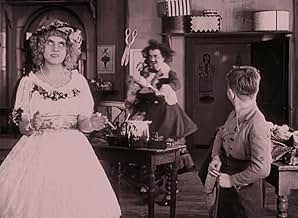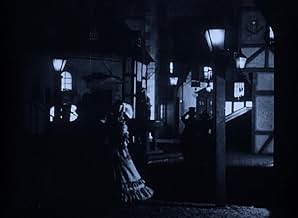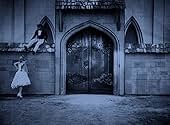IMDb RATING
7.4/10
2.6K
YOUR RATING
Forced into marriage by his uncle, a man decides to fool him by marrying a life-like mechanical doll instead.Forced into marriage by his uncle, a man decides to fool him by marrying a life-like mechanical doll instead.Forced into marriage by his uncle, a man decides to fool him by marrying a life-like mechanical doll instead.
Ernst Lubitsch
- Director in Prologue
- (uncredited)
Featured reviews
People speak of the Lubitsch Touch first showing up in THE OYSTER PRINCESS, but that movie always struck me me as a a good romantic comedy, dimmed by changes in fashion, creaking a bit in age.
But this movie is the real thing: a silly story told with much flair and constant surprises. It begins with Lubitsch showing you a model of the set, like Penn and Teller showing you how they do the cup-and-ball trick, followed by a show that dazzles you: pantomime horses, venal monks and a little bit of E.T.A. Hoffman all fall under the thrall of Lubitsch and all of them, and the audience too, end up with smiles on their faces.
This movie is too good to more than hint at its wonders. If you have never seen a silent feature, see this one.
But this movie is the real thing: a silly story told with much flair and constant surprises. It begins with Lubitsch showing you a model of the set, like Penn and Teller showing you how they do the cup-and-ball trick, followed by a show that dazzles you: pantomime horses, venal monks and a little bit of E.T.A. Hoffman all fall under the thrall of Lubitsch and all of them, and the audience too, end up with smiles on their faces.
This movie is too good to more than hint at its wonders. If you have never seen a silent feature, see this one.
"The Doll" is a delightful feature--the best I've seen of director Ernst Lubitsch's German films. The deliberately artificial and often theatrical settings--flat backdrops, fake trees and people in horse costumes included--by Kurt Richter saliently add to the picture's enchantment and fairytale-like narrative. "The Doll" is similar in this approach to Maurice Tourneur's 1918 films "The Blue Bird" and "Prunella." Like "The Blue Bird," "The Doll" has a few moments that seem reminiscent of the feéries of early-cinema pioneer Georges Méliès, such as the Moon's facial expressions and the stop-motion animation to change the doll maker's hair. Highly-artificial theatricality was also adopted for "The Cabinet of Dr. Caligari" (1920), although in a very different way. Lubitsch begins the film well by appearing in front of the camera to introduce and arrange the mise-en-scène in miniature--a scene that then fades to the actual set and beginning of the story proper.
In it, the baron's nephew doesn't want to marry a woman, so he purchases what he believes is a life-size doll to be his wife. Meanwhile, a real woman, the doll maker's daughter, is pretending to be that doll to hide that the doll maker's apprentice broke the doll that was based on her appearance. So, the nephew thinks he's fooling everyone, when he's the one being fooled. It's a simple narrative, briskly plotted, and very well enacted. The inherent sexism isn't lost on Lubitsch either, as a humorous advertisement offers the doll maker's product to widowers and misogynists alike. Additionally, there are a few light sex jokes throughout. Ossi Oswalda is wonderful, cute and funny, with her various expressions and movements, including the dancing, as she plays the character masquerading as a lifeless doll. Her performance significantly helps make this photoplay entertaining. The slapstick and subplot antics between the wacky-looking doll maker and his young apprentice are even amusing and appreciated.
Dancing and a comedy chase make their way into this and other Lubitsch films. The themes of mistaken identity or masquerading as acting and doubles also underlie the humor of several Lubitsch comedies, in Germany and America. His three earliest comedies that I've seen ("The Merry Jail," "I Don't Want to Be a Man" and "The Oyster Princess") all play with these ideas in different and self-reflexive ways, with characters pretending to be someone else. The girl isn't only doubled as a doll; her image is literally doubled photographically during a dream scene. Moreover, the theme of fakery extends further in "The Doll": the dolls are fake, a real woman fakes being one of them, which is supported by the fake appearance of much of the film's production design. The entire production coalesces to firmly establish the film's world as fantasy. The sets and designs of Lubitsch's German films seem to have always been impressive, but in some of them, it feels that they overwhelm their plays, or that the narratives and characters were never equal to the grand décors, but in "The Doll," it all fits together.
In it, the baron's nephew doesn't want to marry a woman, so he purchases what he believes is a life-size doll to be his wife. Meanwhile, a real woman, the doll maker's daughter, is pretending to be that doll to hide that the doll maker's apprentice broke the doll that was based on her appearance. So, the nephew thinks he's fooling everyone, when he's the one being fooled. It's a simple narrative, briskly plotted, and very well enacted. The inherent sexism isn't lost on Lubitsch either, as a humorous advertisement offers the doll maker's product to widowers and misogynists alike. Additionally, there are a few light sex jokes throughout. Ossi Oswalda is wonderful, cute and funny, with her various expressions and movements, including the dancing, as she plays the character masquerading as a lifeless doll. Her performance significantly helps make this photoplay entertaining. The slapstick and subplot antics between the wacky-looking doll maker and his young apprentice are even amusing and appreciated.
Dancing and a comedy chase make their way into this and other Lubitsch films. The themes of mistaken identity or masquerading as acting and doubles also underlie the humor of several Lubitsch comedies, in Germany and America. His three earliest comedies that I've seen ("The Merry Jail," "I Don't Want to Be a Man" and "The Oyster Princess") all play with these ideas in different and self-reflexive ways, with characters pretending to be someone else. The girl isn't only doubled as a doll; her image is literally doubled photographically during a dream scene. Moreover, the theme of fakery extends further in "The Doll": the dolls are fake, a real woman fakes being one of them, which is supported by the fake appearance of much of the film's production design. The entire production coalesces to firmly establish the film's world as fantasy. The sets and designs of Lubitsch's German films seem to have always been impressive, but in some of them, it feels that they overwhelm their plays, or that the narratives and characters were never equal to the grand décors, but in "The Doll," it all fits together.
Such a charmer. It certainly feels like a Lubitsch film, as it pushes boundaries with sex but in a playful way, makes cheeky observations about human behavior, and has entertaining characters skating along in a light comedy. Pretty impressive, especially for 1919, and well worth 66 minutes.
Some of the bits I liked:
Some of the bits I liked:
- Seeing Lubitsch himself as the film begins, setting up the doll house which the characters then inhabit.
- The performances from Ossi Oswalda (the daughter/doll) and Gerhard Ritterband (the young apprentice). Oswalda's facial expressions and body control as the doll are wonderful, and Ritterband imitations of his boss were amusing. I also chuckled when he kisses his boss's wife after having kissed the doll, "Just so no one feels neglected," and how he later says he's throwing himself out the window out of shame, only to slide out easily from the first story.
- The artistry in the set designs, which while not boldly Expressionistic, have quite a flair, making the film a treat visually. You also get a couple of clearly fake horses, little effects like a montage of close-ups of chattering mouths, a transparency during a dream sequence, and a man's hair turning white when he gets shocking news.
- The doll being advertised as follows: "Offered to bachelors, widowers, and misogynists! I have succeeded, with the help of a mechanism I built, in constructing a human-like doll who can walk, dance, and sing by pushing different buttons." And as an aside, the toymaker has designed it to look like his daughter, even though it's a short leap to think of it as a sex doll being peddled to lonely (and abusive?) men, how creepy is that?
- The priests chowing down food like pigs, not wanting to share, and then finagling their way into getting their hands on the boy's dowry. One of them later ogles the "doll's" legs while she's dancing.
- The family members arguing over possessions before a loved one has even passed away, breaking a vase in the process.
- How the guy who is afraid of girls goes from being chased all over town by 40 young women who all want to marry him to being in the showroom at the dollmaker's, confronted by (probably 40, the same 40) dolls who all hop over to him eagerly, nodding their heads.
- The various innuendo once the young man does take possession of what he thinks is a doll. The toymaker tells him "Don't forget to oil her every two weeks." His father asks him whether he wants any last advice before leaving for the first night of his marriage, to which he replies "No thanks, I have an instruction manual." Oh my goodness, if this isn't classic Ernst Lubitsch, I don't know what is.
This comedy from the hands of Ernst Lubitsch in 1919 is a joyride through a number of imaginative sets and situations. Even though its artificiality if ever apparent, the movie makes it work by playing with the costumes and sets, to create a whimsical world where everything can happen.
Like other Lubitsch films the plot of this is build upon similar themes such as facade and identity. Although not my favourite of Lubitsch's films it hold a place in the top five. This movie is assured to put a smile on your face the whole way through, driven by Lubitsch's at times expressive directing.
Like other Lubitsch films the plot of this is build upon similar themes such as facade and identity. Although not my favourite of Lubitsch's films it hold a place in the top five. This movie is assured to put a smile on your face the whole way through, driven by Lubitsch's at times expressive directing.
I caught this on TCM, it is a completely captivating and delightful experience for all ages, so many layers in this story. Cannot recommend it enough for its period charm and generally kookiness.
However, the cast list here on IMDB is a mess due to faulty translations. "Dessen Frau" means "His Wife", and refers to Baron Chanterelle (chanterelles are a group of mushrooms, much eaten in Germany in late summer/autumn.) Similarly, "His Daughter" (Ossi, or The Doll) again refers to the Baron as her father. "The Briar" (!) should, I think, be The Friar; only in the film he is in fact the Abbot of the monastery, not merely a Brother. Wikipedia gets it all correct on its page about this film.
However, the cast list here on IMDB is a mess due to faulty translations. "Dessen Frau" means "His Wife", and refers to Baron Chanterelle (chanterelles are a group of mushrooms, much eaten in Germany in late summer/autumn.) Similarly, "His Daughter" (Ossi, or The Doll) again refers to the Baron as her father. "The Briar" (!) should, I think, be The Friar; only in the film he is in fact the Abbot of the monastery, not merely a Brother. Wikipedia gets it all correct on its page about this film.
Did you know
- TriviaAt one point Lancelot takes a heart out of the leg of his pants. This is an allusion to the German expression 'Das Herz ist mir in die Hose gerutscht' (my heart slid into my pants) which is equivalent to 'to have one's heart in one's boots'.
- GoofsLancelot shouts his alarm to a monk that he is being pursued by "40 women". However, about 20 women are seen on screen.
He says this because the butler earlier had announced "Forty women at the door!" It's an estimate as it's doubtful the butler made an individual count. Also, there is no "requirement" that all referenced individuals must appear on screen.
- Quotes
Baron von Chanterelle: [on Lancelot's wedding night] Do you need any more pieces of advice?
Lancelot: No thanks, I have an instruction manual.
- ConnectionsFeatured in Cinema Europe: The Other Hollywood (1995)
- How long is The Doll?Powered by Alexa
Details
- Release date
- Country of origin
- Languages
- Also known as
- Nürnbergerdockan
- Production company
- See more company credits at IMDbPro
- Runtime
- 1h 6m(66 min)
- Sound mix
- Aspect ratio
- 1.33 : 1
Contribute to this page
Suggest an edit or add missing content






























